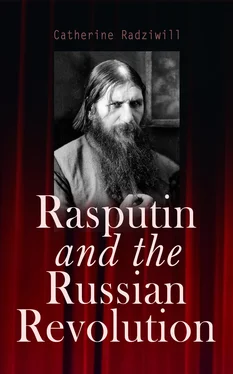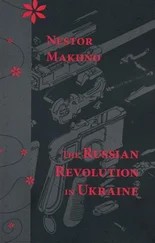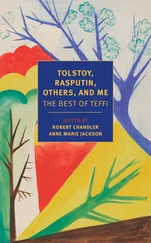In the Duma his name had been mentioned more than once, and always with contempt. Every kind of reproach had been hurled at him, and others had not been spared. He had become at last a fantastic kind of creature, more exploited than exploiting, more destroyable than destructive, one whose real “rôle” will never be known to its full extent, who might in other countries than Russia and at another time have become the founder of some religious order or secret association. His actions when examined in detail do not differ very much from those of the fanatics which in Paris under the reign of Louis XV. were called the “Convulsionnaires,” and who gave way to all kind of excesses under the pretext that these were acceptable to God by reason of the personality of the people who inspired them. In civilised, intelligent, well-educated Europe such an apparition would have been impossible, but in Russia, that land of mysteries and of deep faiths, where there still exist religious sects given to all kinds of excesses and to attacks of pious madness (for it can hardly be called by any other name), he acquired within a relatively short time the affections of a whole lot of people. They were inclined to see in him a prophet whose prayers were capable of winning for them the Divine Paradise for which their hungry souls were longing. There was nothing at all phenomenal about it. It was even in a certain sense quite a natural manifestation of this large Russian nature, which is capable of so many good or bad excesses and which has deeply incrusted at the bottom of its heart a tendency to seek the supernatural in default of the religious convictions which, thanks to circumstances, it has come to lose.
The American public is perhaps not generally aware of the character of certain religious sects in Russia, which is considered to be a country of orthodoxy, with the Czar at its head, and where people think there is no room left for any other religion than the official one to develop itself. In reality, things are very different, and to this day, outside of the recognised nonconformists, who have their own bishops and priests, and whose faith is recognised and acknowledged by the State, there are any number of sects, each more superstitious and each more powerful than the other in regard to the influence which they exercise over their adherents. These, though not numerous by any means, yet are actuated by such fanaticism that they are apt at certain moments to become subjects of considerable embarrassment to the authorities. Some are inspired by the conviction that the only means to escape from the clutches of the devil consists in suicide or in the murder of other people.
For instance, the Baby Killers, or Dietooubitsy, as they are called, think it a duty to send to Heaven the souls of new-born infants, which they destroy as soon as they see the light of day, thinking thus to render themselves agreeable to the Almighty by snatching children away from the power of the evil one. Another sect, which goes by the name of Stranglers, fully believes that the doors of Heaven are only opened before those who have died a violent death, and whenever a relative or friend is dangerously ill they proceed to smother him under the weight of many pillows so as to hasten the end. The Philipovtsy preach salvation through suicide, and the voluntary death of several people in common is considered by them as a most meritorious action. Sometimes whole villages decide to unite themselves in one immense holocaust and barricade themselves in a house, which is afterward set on fire.
An incident that occurred during the reign of Alexander II. is remembered to this day in Russia. A peasant called Khodkine persuaded twenty people to retire together with him into a grotto hidden in the vast forests of the government of Perm, where he compelled them to die of hunger. Two women having contrived to escape, the fanatics, fearing that they might be denounced, killed themselves with the first weapons which fell under their hand. It was their terror that they might find themselves compelled to renounce their sinister design, and thus fall again into the clutches of that Satan for fear of whom they had made up their minds to encounter an awful death. Even as late as the end of the last century such acts of fanaticism could be met with here and there in the east and centre of Russia. In 1883, under the reign of the father of the last Czar, a peasant in the government of Riazan, called Joukoff, burnt himself to death by setting fire to his clothes, which he had previously soaked in paraffin, and expired under the most awful torments, singing hymns of praise to the Lord.
Among all these heresies there are two which have attracted more than the others the attention of the authorities, thanks to their secret rites and to their immoral tendencies. They are the Skoptsy, or Voluntary Eunuchs, about which it is useless to say anything here, and the Khlysty, or Flagellants, which to this day has a considerable number of adepts and to which Rasputin undoubtedly belonged, to which, in fact, he openly owed allegiance. This sect, which calls itself “Men of God,” has the strangest rites which human imagination can invent. According to its precepts, a human creature should try to raise its soul toward the Divinity with the help of sexual excesses of all kinds. During their assemblies they indulge in a kind of waltz around and around the room, which reminds one of nothing so much as the rounds of the Dancing Dervishes in the East. They dance and dance until their strength fails them, when they drop to the floor in a kind of trance or ecstasy, during which, being hardly accountable for their actions, they imagine that they see Christ and the Virgin Mary among them. They then threw themselves into the embrace of the supposed divinities.
As a rule the general public knows very little concerning these sects, but I shall quote here a passage out of a book on Russia by Sir Donald Mackenzie Wallace, which is considered to this day as a standard work in regard to its subject. “Among the ‘Khlysty,’” he writes, “there are men and women who take upon themselves the calling of teachers and prophets, and in this character they lead a strict, ascetic life, refrain from the most ordinary and innocent pleasures, exhaust themselves by long fasting and wild ecstatic religious exercises and abhor marriage. Under the excitement caused by their supposed holiness and inspiration, they call themselves not only teachers and prophets, but also Saviours, Redeemers, Christs, Mothers of God. Generally speaking, they call themselves simply gods and pray to each other as to real gods and living Christs and Madonnas. When several of these teachers come together at a meeting they dispute with each other in a vain, boasting way as to which of them possesses most grace and power. In this rivalry they sometimes give each other lusty blows on the ear, and he who bears the blows the most patiently, turning the other cheek to the smiter, acquires the reputation of having the most holiness.
“Another sect belonging to the same category and which indeed claims close kindred with it is the Jumpers, among whom the erotic element is disagreeably prominent. Here is a description of their religious meetings, which are held during summer in a forest and during winter in some outhouse or barn. After due preparation prayers are read by the chief teacher, dressed in a white robe and standing in the midst of the congregation. At first he reads in an ordinary tone of voice and then passes gradually into a merry chant. When he remarks that the chanting has sufficiently acted on the hearers he begins to jump. The hearers, singing likewise, follow his example. Their ever-increasing excitement finds expression in the highest possible jumps. This they continue as long as they can—men and women alike yelling like enraged savages. When all are thoroughly exhausted the leader declares that he hears the angels singing, and then begins a scene which cannot be here described.”
Читать дальше












